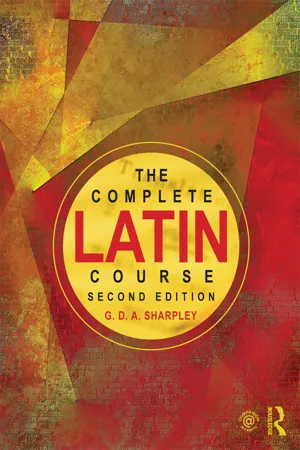
The Complete Latin Course
G D A Sharpley
- 394 páginas
- English
- ePUB (apto para móviles)
- Disponible en iOS y Android
The Complete Latin Course
G D A Sharpley
Información del libro
The Complete Latin Course is a comprehensive introduction to Latin for students and armchair enthusiasts alike. This modern, user-friendly text offers a series of fascinating glimpses into the world of ancient Rome, and sets you up to read Virgil, Cicero, Juvenal, Tacitus and many other authors in the original Latin.
The story of Rome is told by the ancient authors themselves. Authentic texts help to guide the student through the mechanics of Latin, whilst giving insights into the history of Rome, her culture and society, her gods, her games, her power struggles and the eventual fall of empire.
Originally published as Essential Latin, this extensively revised and expanded second edition features:
- Reading passages from Latin prose authors, including Cicero, Petronius, Pliny, Sallust, Suetonius and Tacitus, and from poets (Catullus, Horace, Juvenal, Martial, Ovid and Virgil) with guidance on reading aloud and meter.
- A detailed step-by-step approach to Latin g rammar, with engaging activities and exercises.
- A companion website with a full answer key for exercises, translations, grammar reference tables for the USA, the UK, Europe and elsewhere, additional exercises, word lists and other supports: http://www.lingua.co.uk/latin/materials/complete-latin
Ideal for classroom use or independent study, The Complete Latin Course will prove an invaluable resource for undergraduate and postgraduate students, adult learners and anyone interested in comprehensively developing their knowledge of Latin.
Preguntas frecuentes
Información
– 1 –
Myth, legend and history
Nouns and verbs
Practice 1a
Nouns: subjects and objects
| farmer as subject is | agricola |
| and as object | agricolam |
| bull as subject is | taurus |
| and as object | taurum |
Negative
| farmer | girl | bull | slave | |
| as subject | agricola | puella | taurus | servus |
| as object | agricolam | puellam | taurum | servum |